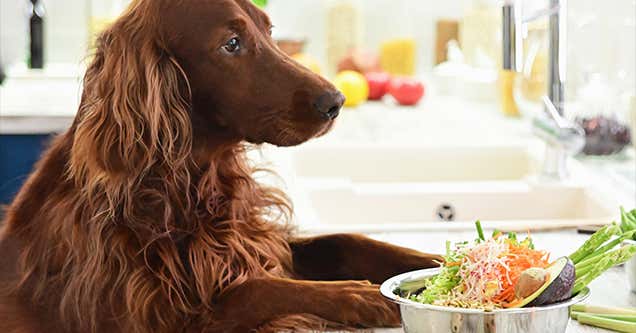Are you looking for homemade food for a pregnant dog? Pet owners want to feed their dogs the best food possible, yet most of us believe that dog food on the market is too costly or of poor quality to meet our needs.
You must feed your dog well-balanced food to prevent deficiency and sickness. Vitamin and mineral deficiencies may affect a dog’s coat, behavior, and growth.
When it comes to pups, it might happen in a matter of weeks. You do not have to pay a fortune to feed your dog now that you can prepare it yourself. When picking ingredients, keep these points in mind. Here you will also get to know about the supplements for pregnant dogs.
Meat selection If you are looking for healthy food for pregnant pets, meat is the primary component. Carnivorous dogs need a protein-rich diet. Meat possibilities for your dog include lamb, hog, turkey, chicken, et al.
When feeding your dog, don’t skimp on the meat quality. You may also give your dog fish occasionally, although it is not recommended.
Vegetables
So what to feed a pregnant dog? Only approximately a quarter of a dog’s diet is vegetables. Vitamins, minerals, and fiber may all be found in it. However, pureeing the veggies rather than slicing them will provide your dog with more nourishment. But you can’t feed your dog everything, and the veggies you should avoid include onion, potato, and tomato; raw beans; garlic; leek; chard; and beet greens; as well as spinach.
Limit your intake of carbohydrate-containing foods
Dogs cannot digest carbohydrates because they lack the necessary digestive enzymes. Please do not feed your dog these since they have no nutritional benefit and might be harmful to them.
Obesity, inflammatory bowel disease, renal disease, and allergies may be caused partly by carbohydrate consumption in dogs; thus, it is essential to limit their intake of these grains. Also, check out the list of what to feed a pregnant dog that will not eat.
Utilize the appropriate nutritional aids
It is impossible to get all the nutrients you need from even the most incredible meals. If you are giving your homemade dog food, you’ll need to supplement it with vitamins
A nutritionist should be consulted before any supplements are delivered to your dog. An easy-to-make healthy food for pregnant pets Ingredients
- Six glasses of water
- Ground beef weighing one pound
- Uncooked brown rice: 2 cups
- Dried rosemary: 1 teaspoon
- One cup of broccoli, carrots, and cauliflower florets
- These are the procedures
- Combine the water, ground beef, rice, and rosemary on medium heat
- Make sure it’s done cooking by simmering for 20 minutes
- Incorporate the veggies and simmer for a further few minutes to soften them
What kind of food should I give my pregnant dog?
A standard dog pregnancy lasts 62 days, with two days for gestation. There are three trimesters to the pregnancy, and a healthy, well-fed dog will acquire roughly 15% to 20% more weight than she did at breeding.
A pregnant dog that is overfed runs the danger of having a complex or lengthy delivery and of putting undue strain on the pups. However, underfeeding during pregnancy may result in embryo loss, aberrant fetal development, spontaneous abortion or stillbirth, a small litter size, and underweight newborns who do not grow up to be healthy.
Pregnant women’s dietary needs are pretty similar to those of an adult dog throughout the first two trimesters of their pregnancy. Monitor her weight and body condition to ensure that she doesn’t lose weight or shape throughout this period.
It is equally crucial that a dog does not grow overweight or obese due to overfeeding in the first and second trimesters. Pregnancy weight gain may be managed most effectively by regular, balanced meals.
Puppies’ rapid growth places a heavy load on their mothers throughout the third trimester, which begins around day 40 of pregnancy. During the sixth and eighth weeks of pregnancy, the mother’s energy needs are at their peak. For the first several weeks after birth, her energy needs maybe 30-60% more than a regular adult cat.
Third-trimester challenges, particularly around birth, stem from pregnant women’s abdomens crammed with pups, leaving little food capacity in the digestive tract.
High-quality puppy/growth/development formula should be fed to the mother during the third trimester of pregnancy to provide enough nutrition and calorie intake.
Because it lacks the proper mix of calcium and phosphorus to promote fetal bone development and good milk supply, do not give big breed puppy chow to your small breed puppy. Supplementation with folic acid and necessary fatty acids may help support-developing fetuses.
They may all sleep together that night, and the puppies will be happy to take a few sips of milk from their mothers. Puppy separation occurs on day two of weaning when the puppies are born from their mother, and she is given around 25% of her pre-breeding quantity and formulation.
Increase her pre-breeding portions during the following four to five days. During this period, pups should not be permitted to nurse since this might prolong the drying out of the milk supply.
Preparation and consultation with your veterinarian may help you develop a pregnancy and lactation diet to ensure a healthy litter of pups. Check out the list of best dry dog food for pregnant dogs.
Conclusion
Healthy food for pregnant pets needs special attention to ensure their well-being and the well-being of their offspring. Pregnant dogs should be fed a high-protein, high-fat, and high-mineral diet.
Your dog’s food consumption will rise by roughly 1.5 times the typical rate during pregnancy; therefore, you may need to buy additional food for pregnant dogs. Do not deprive a pregnant dog of food since she will need more nutrients to give birth to healthy pups.
Pregnant dogs should speak with their veterinarian about the best performance meals to feed them. In addition to eating more often, the pregnant dog may also consume smaller food portions. This is to be expected, particularly if she is suffering from morning sickness now.























Comments